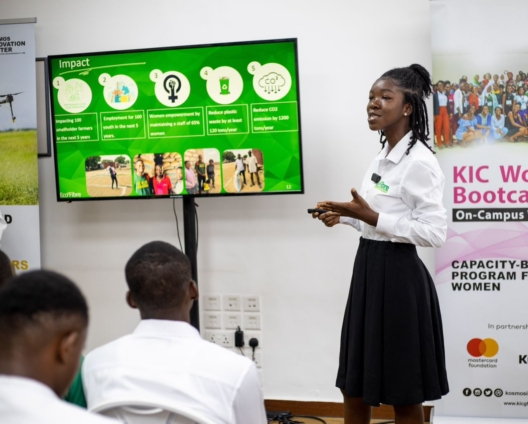KIC and Mastercard Foundation have organised a First Pitch for the 2023 cohort of the Agritech Challenge Pro ahead of the Final Pitch event to take place in May 2024. The First Pitch took place at Kosmos Innovation Center in Accra, where the AgriTech Challenge Pro participants received feedback from Ideation Team members, a team of business experts across the agribusiness and agri-MSMEs sectors.
AgriTech Challenge Pro was introduced by KIC to provide young people with entrepreneurial skills within the agricultural sector. Through the 5-month program, young people are trained to grow their businesses, develop skills and capacity to scale up and become investor ready. The teams receive capacity building and training on business development, business diagnostics, design thinking, marketing, legal documentation, business team formation, among others.
Through KIC’s partnership with the Mastercard Foundation, the AgriTech Challenge Pro expects to train young people across the partner universities in the next two years, collaborating with regional academic partners such as universities and technical schools. The participating universities for this year’s Challenge include University of Ghana (UG), Kwame Nkrumah University of Science and Technology (KNUST), University of Cape Coast (UCC), Bolgatanga Technical University (BTU), Takoradi Technical University (TTU), Ho Technical University (HTU), Koforidua Technical University (KTU), University of Development Studies (UDS), SD Dombo University of Business & Integrated Development Studies (UBIDS), and University of Energy and Natural Resource (UENR).
Since 2022, the participants to the KIC AgriTech Challenge Pro join from the KIC AgriTech Challenge Classic, where KIC supports young people with a business idea, to develop these into agri-startups . At the Pro stage of the competition , these businesses already exist as registered legal entities. Other participants also join the program from already existing start-ups.
Speaking about the impact of the KIC AgriTech Challenge Pro, Benjamin Gyan-Kesse, Executive Director, highlighted the important role of the training and capacity building in providing the young people with practical training on agribusiness management.
“Every year, young people from the participating universities and colleges develop business solutions tailor made to address some of the critical challenges facing the agricultural sector. Particularly, this year, many of the businesses are focusing on sustainability, green businesses, and circular economies, cutting across different agro-related industries,” he said.
Enabling a climate action through agritechnology and innovation
This year 40 teams are pitching from ten universities across the country, with a strong focus on climate related interventions and technology focusing on bio-degradable innovations from waste agricultural produce, carbon reduction innovations, Agric manufacturing implements among others. From climate smart agricultural practices to eco-friendly packaging, the ideas from these young people are contributing to environmental responsibility and reducing the impact of agricultural activities on the environment.
For example, as a start-up, Cas-Tech Glue (Takoradi Technical University) harnesses cassava byproducts and process it into biodegradable, user friendly and multipurpose adhesive (glue) for wood and wallpaper industries. Sunify Solardry Technology (University for Development Studies) is a company that is developing an affordable and portable mobile solar dryer to address post-harvest losses among rural grain farmers. This innovative solution harnesses solar energy to efficiently dry grains, reducing losses and improving income for farmers. For a start-up like Agricem innovations (UBIDS), the need for sustainable construction practices led to the introduction of Rango Cement from rice husk, a renewable agricultural byproduct. This innovative approach significantly reduces the carbon footprint of cement production, addressing environmental concerns.
Greenwood company (University of Ghana) helps reduce carbon footprint to the barest minimum by the production and processing of sanitary tissues, charcoal, plywood and bamboo tea using a very sustainable wood option, Bamboo. On their part, Hyfe Bee (Ho Technical University) is dedicated to sustainable beekeeping practices and the production of high-quality honey, wax, and propolis.
Harvest Ease Innovators (University of Energy and Natural Resources) is a company which focuses on agricultural mechanization in Ghana. Starting with maize, the company builds small harvesters which harvest and de-husk maize from its stalk. Their method is efficient and cost effective compared to traditional way of harvesting maize. Farmercy Technologies Ltd. (KNUST) solves the problem of post-harvest losses for small-scale farmers in Ghana, by preventing farm waste through an innovative solar-powered micro cold storage network.
Out of the 40 teams participating in the competition, some teams will be selected to receive funding support of up to USD50,000, to scale up their operations.
KIC remains committed to developing young entrepreneurs.
Latest Stories
-
Paris 2024: Opening ceremony showcases grandiose celebration of French culture and diversity
3 hours -
How decline of Indian vultures led to 500,000 human deaths
4 hours -
Paris 2024: Ghana rocks ‘fabulous fugu’ at olympics opening ceremony
4 hours -
Trust Hospital faces financial strain with rising debt levels – Auditor-General’s report
5 hours -
Electrochem lease: Allocate portions of land to Songor people – Resident demand
5 hours -
82 widows receive financial aid from Chayil Foundation
5 hours -
The silent struggles: Female journalists grapple with Ghana’s high cost of living
5 hours -
BoG yet to make any payment to Service Ghana Auto Group
5 hours -
‘Crushed Young’: The Multimedia Group, JL Properties surprise accident victim’s family with fully-furnished apartment
6 hours -
Asante Kotoko needs structure that would outlive any administration – Opoku Nti
6 hours -
JoyNews exposé on Customs officials demanding bribes airs on July 29
7 hours -
JoyNews Impact Maker Awardee ships first consignment of honey from Kwahu Afram Plains
8 hours -
Joint committee under fire over report on salt mining lease granted Electrochem
8 hours -
Life Lounge with Edem Knight-Tay: Don’t be beaten the third time
8 hours -
Pro-NPP group launched to help ‘Break the 8’
9 hours

